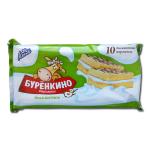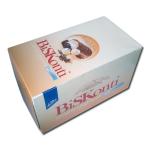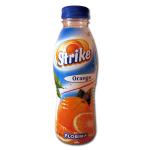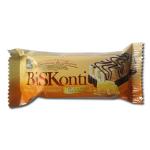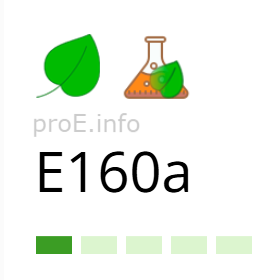
Other names for the additive (synonyms)
General Information
Food additive E160a (carotenes) belongs to the group of coloring substances - carotenoids, labeled in the food industry as additive E160.
The term "Carotene" derives its name from the word "carota" - carrot. It is an orange pigment that is formed during plant photosynthesis. Carotenes color fruits and vegetables in orange and yellow hues. They are not produced in the human and animal bodies.
Carotene is found in carrots, apricots, melons, persimmons, cabbage, parsley, pumpkin, sweet potato, and mango. Generally, the higher the intensity of the orange color in a product, the more carotene it contains. Food additive E160a is a provitamin of vitamin A. It is insoluble in water but can dissolve in fats and organic solvents. In the industry, the E160a colorant is either extracted from carotene-rich products or synthesized chemically. Depending on the production method, several subtypes of the additive are distinguished:
- E160a(i) – synthetic beta-carotene;
- E160a(ii) – natural carotene extract.
- E160a(iii) – beta-carotenes obtained from Blakeslea trispora.
Synthetic carotene is supplied from the USA. Natural carotene is produced in Spain (from specific mushrooms) or Australia (from dried seaweed). The E160a food coloring is also derived from carrots, red palm oil, and corn seeds. The source of additive E160a can also be other plants and certain types of bacteria.
There are two main forms of carotenes: alpha-carotene (α-carotene) and beta-carotene (β-carotene). Additionally, there are gamma, delta, epsilon, and zeta carotenes (γ, δ, ε, and ζ-carotene), but they have not gained widespread use. Alpha and beta carotene molecules are almost identical, differing only in the positions of double bonds in the end ring of the molecule.
The chemical formula of carotene is С40H56.
Effects on the Body
Benefits of Additive E160a
Carotene is an essential element that serves as the main source of vitamin A. Therefore, the E160a additive:
- Acts as an antioxidant;
- Slows down the aging process;
- Helps prevent a decline in cognitive functions.
Beta-carotene is prescribed to individuals with increased light sensitivity.
Consuming beta-carotene as part of products containing food additive E160a does not pose any harm to the body due to the small doses and the body's ability to convert carotene into the essential vitamin A.
Risks of Additive E160a
Excessive carotene intake can be harmful and lead to the development of carotenemia. However, carotene has low toxicity, so this condition is not dangerous. The main manifestation of excess carotene in the body is a change in skin color (turning orange). Carotene can be deposited in fatty tissues and the liver (human fat has a yellowish hue due to carotene accumulation). Additionally, unprocessed carotene in animal bodies can impart a yellowish color to cow's milk and the products derived from it (cottage cheese, butter, sour cream).
It is not recommended to actively use the E160a food additive for individuals at risk of developing cancer, smokers, alcohol abusers, and workers in the absinthe industry. According to research published in the Journal of the National Cancer Institute, excessive consumption of beta-carotene in food increases the risk of cancer in these groups. However, there are no studies that demonstrate the same risk for the general population as a whole.
Usage
In the food industry, beta-carotene is used as a safe coloring agent for various products, including:
- Juices and beverages;
- Confectionery;
- Butter and margarine;
- Certain types of cheese;
- Canned vegetables;
- Cereal products;
- Jams, jellies, and marmalades;
- Fruit processing products;
- Meat products such as sausages, sardines, pâtés, cooked meats.
In addition to the food industry, beta-carotene is used in nanotechnology and medicine.
Legal Status
Additive E160a is permitted for use in food products in Russia, Ukraine, and many other countries.
